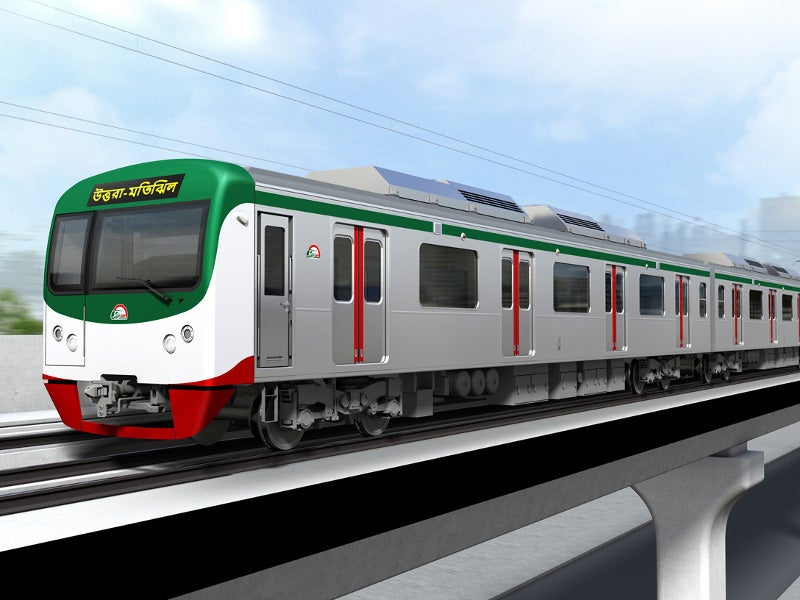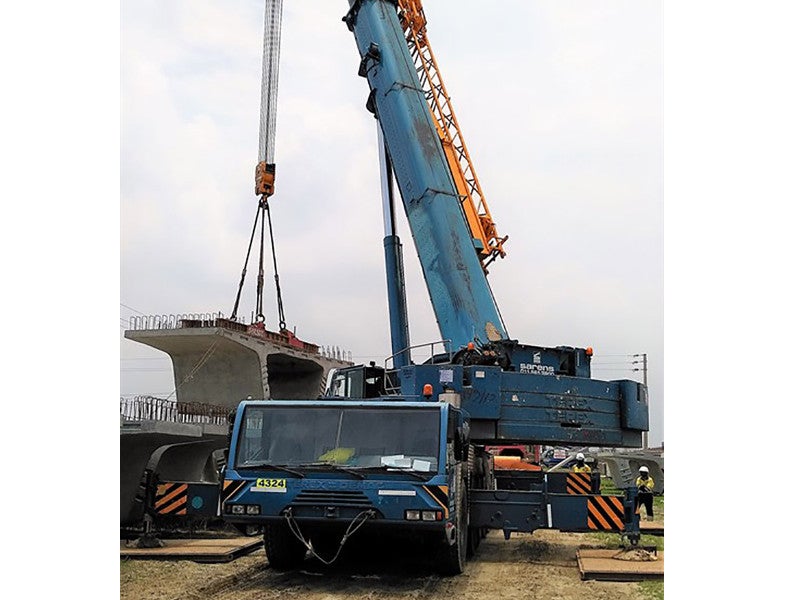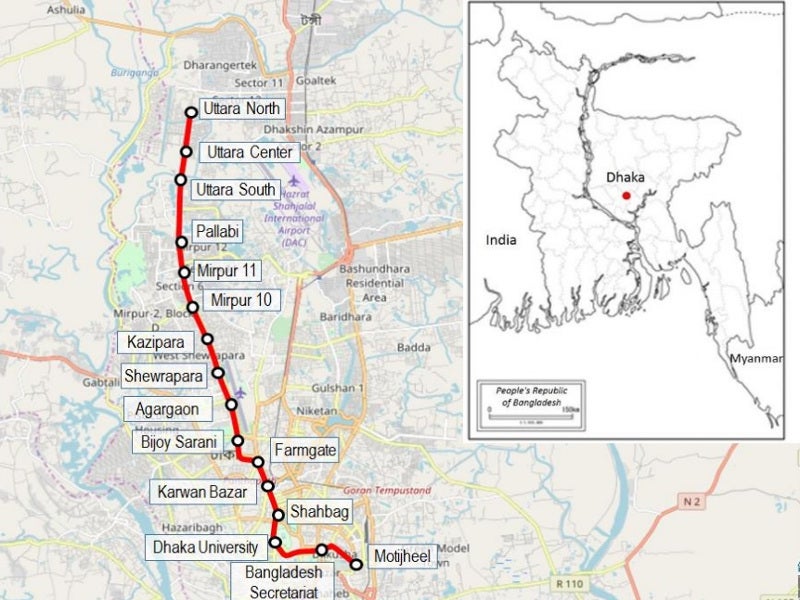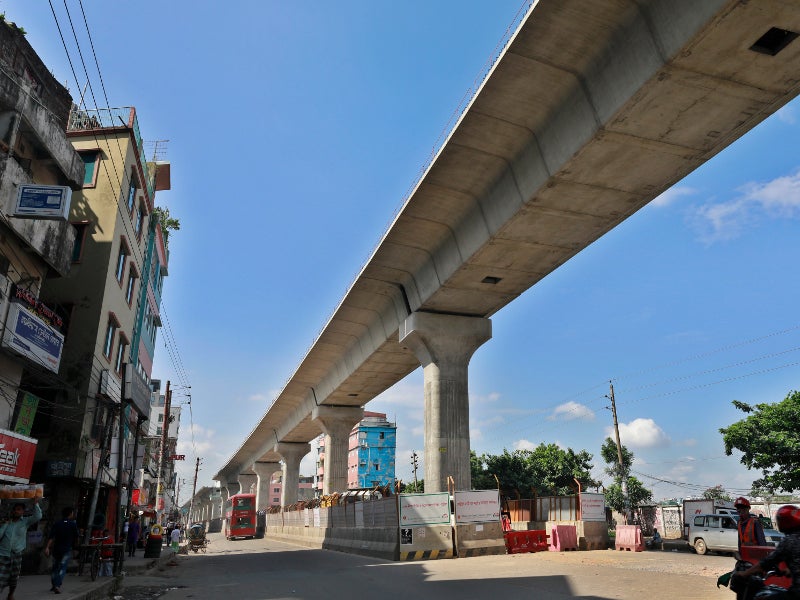The Dhaka Metro Mass Rapid Transit (MRT) is a new metro rail system that is being developed by the Dhaka Mass Transit Company (DMTC) in Dhaka, Bangladesh.
The public transport system will aid in the economic and social development of the greater Dhaka area, which is facing traffic congestion and pollution issues.
A total of five lines, MRT Lines 1, 2, 4, 5, and 6, have been proposed for the project. MRT Line 6 is the first line to be approved under the project and is estimated to cost $2.82bn.
In 2021, the first metro train test on Line 6 was conducted from Uttara North to Pallabi. Phase one of the line comprising a 12km-long route from Diabari to Agargaon was inaugurated in December 2022 and commenced operations in January 2023.
Phase two of Line 6 from Agargaon to Motijheel is expected to be completed in 2023 while phase three comprising a 1.16km extension from Kamalapur to Motijheel will open in 2025. The extension will be interconnected with the future Line 1 and the capital’s railway station.
Dhaka Metro development history
The Dhaka Transport Coordination Authority (DTCA) created a 20-year strategic transport plan (STP) in 2005 to transform and develop a more integrated transit system for the rapidly growing capital.
The Dhaka Metro MRT system was subsequently conceived to provide more transport options. The project aims to be combined with the bus rapid transit (BRT) and mass rapid transit (MRT) projects.
The Dhaka Urban Transport Network Development Survey (DHUTS 1) funded by the Japan International Cooperation Agency (JICA) assessed Dhaka’s STP and selected the first MRT Line 6 from Uttara, a northern suburb to Motijheel, for development. Design work on Line 6 started in 2014.
The 20-year STP was revised in 2016 to reflect current transportation requirements. Five MRTs and two BRTs are to be developed, according to the revised STP (RSTP).
Feasibility studies and environmental impact assessments for the MRT Lines 1 and 5 have also been completed.
Details of MRT Line 6
MRT Line 6 is a 21.26km line extending from Uttara in the north to Kamalapur in the south. The line runs parallel to the Turag River in the west of Dhaka and curves as it moves south-east following the path of the Buriganga River.
The line will be a standard gauge track, including a total of 16 elevated stations crossing busy areas such as Pallabhi and Mirpur. The travel time from north to south Dhaka will be approximately 35 minutes.
Construction details of MRT Line 6
The construction of Line 6 has been divided into eight packages.
Involving depot land development, CP-01 commenced in September 2016 and was completed in January 2018. CP-02 was undertaken between September 2017 and June 2022 and focused on civil and building works at the depot.
Packages CP-03 and CP-04 include the civil construction works on an 11.74km viaduct and nine elevated stations between Uttara North and Agargaon that commenced in August 2017.
CP-05 includes the construction of 3.195km of viaducts and three elevated stations between Agargaon and Karwan Bazar while CP-06 includes the construction of a 4.92km viaduct and four elevated stations between Karwan Bazar and Motijheel. Work on both packages commenced in August 2018.
CP-07 involves the procurement of electrical and mechanical systems while CP-08 includes the procurement of rolling stock and depot equipment.
Rolling stock and infrastructure details for MRT Line 6
The MRT Line 6 will feature 24 six-car train sets made of lightweight and durable stainless-steel. The commuter cars will measure 19.8m long, 2.95m wide, and 4.1m high. The maximum speed of the train is expected to be 100km/h.
CCTV cameras will be deployed inside and outside of the commuter cars to ensure the safety of passengers. Additionally, each car will have two air-conditioning units to combat the high temperatures and humidity in Dhaka. Each car will have four doors on each side.
Line 6 infrastructure includes automatic fare collection systems, platform screen doors, staircases, elevators, and escalators. The length of each platform is expected to be approximately 180m.
In April 2021, Japan delivered the first set of metro trains to Dhaka.
Financing of MRT Line 6
JICA is providing approximately 75% or $2.13bn of the estimated investment of Line 6 while the Bangladeshi Government is funding the remaining 25%, which amounts to $690m. Other forms of grants for training and preparing studies are also provided by JICA.
Asian Development Bank (ADB) announced a $33.26m concessional loan for the southern route of Line 5 in November 2019.
MRT Line-1 details
The 31.24km-long Line 1 comprises two routes, the Airport Line and the Purbachal Line.
The Airport Line will connect the Hazrat Shahjalal International Airport to Kamalapur and will include 12 stations. The route will be 19.87km long, of which 16.4km will be underground.
The 11.34km-long Purbachal Line extends from Notun Bazar to Purbachal with seven stations.
Dhaka Metro Line 5 details
Line 5 will have two routes, northern and southern. Line 5’s northern route will be 20km long, extending from Hemayetpur to Vatara. It will include a 13.5km underground stretch to cover high-density areas from Gabtoli to Notun Bazar. The line’s construction will be divided into ten packages.
The line will also include a 6.5km viaduct running between Hemayetpur and Amin Bazar and from Notun Bazar to Vatara. It will cover 14 stations, including Gabtoli, Dar-us-salam, Mirpur1, Mirpur10, Mirpur14, Kochunkhet, Banani, Gulshan2 and Notun Bazar.
Line 5 will connect with Line 6 at Mirpur and Line 1 at Notun Bazar. The expected travel time on the route is 30 minutes and 30 seconds.
The southern route of Line 5 is proposed to be an underground route running from Gabtoli through Adabor, Mohammadpur, Kalabagan, Karwan Bazar, Hatirjheel, and South Badda to Aftab Nagar.
Contractors involved
A joint venture of Marubeni and L&T was awarded a $510m contract by DMTC to provide electrical and mechanical rail systems for Line 6 in June 2018.
Kawasaki Heavy Industries (KHI) and Mitsubishi Corporation were awarded a $368m contract by DMTC in August 2017 for supplying rolling stock and maintenance equipment for Line 6.
Rail infrastructure solutions provider Pandrol was subcontracted by L&T to provide rail fastening solutions for Line 6 in May 2019 while Himachal Futuristic Communications, an India-based telecom infrastructure company, was subcontracted to implement telecommunication systems.
L&T contracted Toshiba Infrastructure Systems & Solutions Corporation (TISS) to deliver eight sets of traction energy storage systems for Line 6 in 2020.
Sinohydro Corporation, a China-based engineering and construction company, and Italian-Thai Development Public Company, a Thai construction company, were contracted to perform civil construction for Line 6 in May 2017.
The preparatory study for the project was carried out by JICA, Almec Corporation, Oriental Consultants Global, and Nippon Koei. The environmental impact assessment was prepared by the NKDM Association comprising Nippon Koei, Katahira & Engineers International, Oriental Consultants, Delhi Metro Rail Corporation (India), Nippon Koei India, Mott MacDonald, and Development Design Consultants.
Systra, which worked for lines 1, 5 and 6, won another contract in a joint venture for providing consulting services for Line 1 in November 2022.
Consulting, construction engineering and operating firm Egis was contracted to provide consulting, design and tender assistance services for Line 5 in 2021.
Heavy lift and engineered transport solutions provider Sarens supplied a hydraulic crane for the project.
ABB, an electrification and automation company, supplied M4M network analysers for the project.
Other contractors involved in the project include Shah Cement, a cement supplier; Utracon Overseas, a construction company; and Amir Group, an investment adviser firm.







